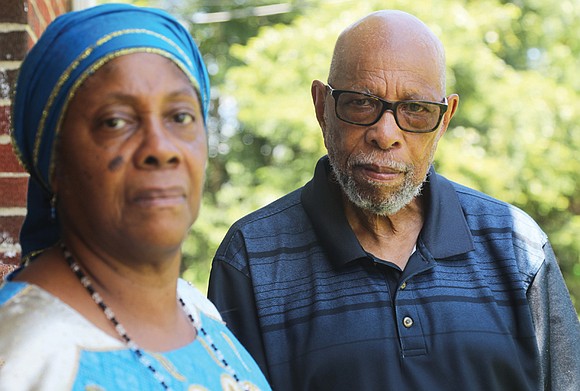UPAL, Sa’ad El-Amin partnership seeks to decrease high levels of lead in soil, water
‘Our goal is to prevent thousands of children from experiencing lead poisoning like those in Flint’
Caroline Reinhart | 8/24/2023, 6 p.m.

To increase awareness of lead hazards in water and implore the City of Richmond to support a full retrofit of lead service lines, United Parents Against Lead (UPAL) on July 15 joined forces with 1619 Inc., headed by former Richmond Councilman, Sa’ad El-Amin.
The collaboration focuses on keeping vulnerable populations safe from high lead concentrations found in contaminated paints, soil and water. Children with elevated blood lead levels can experience numerous neurological defects and physical ailments. Because of these adverse impacts, the Environmental Protection Agency (EPA) and the Centers for Disease Control and Prevention (CDC) state that any amount of lead over zero is detrimental to children’s health.
Unfortunately, lead still persists in drinking water systems around the United States. Nationwide, the EPA estimates there are still 6 to 10 million lead service lines, a portion of which expose approximately 400,000 schools and child care facilities to the harms of lead poisoning.
Many of these pipes are concentrated in older urban areas with aging infrastructure since Congress banned lead pipelines and solder in 1986. For example, Flint, Mich., a majority-black and impoverished city, continues to endure a water quality crisis that began in 2014 due to a switch in the water supply that contaminated their drinking water system with high concentrations of lead.
“Most cities including Richmond are Flints waiting to happen,” said Queen Zakia Shabazz, the founder and director of UPAL. “Our goal is to prevent thousands of children from experiencing lead poisoning like those in Flint, Michigan.”
Ms. Shabazz’s toddler was poisoned by lead in her home, prompting her to establish UPAL organization in 1996. UPAL creates networks of parents with similar experiences in an effort to educate and spread awareness about the crisis and how to manage their children’s health. The strong support system and parent advocacy group has grown, being funded millions of dollars by the Department of Housing and Urban Development. With this funding, UPAL conducts residential lead tests and remediation efforts. The organization has also certified contractors, painters, and other tradesmen in EPA’s Renovation Repair and Painting and created a Lead Dust Sampling Technician course.
Now, UPAL is working with 1619 Inc., an organization that corrects misinformation regarding the history of Enslaved Africans, to spread awareness about child lead poisoning due to water contamination.
“[Lead poisoning] is a problem of people not knowing and not trying to get their water fixed because they don’t know they have a problem with their water,” Mr. El-Amin said. “This is a tragedy in progress with no public awareness.”
To help residents identify any water hazards, the organizations’ collaboration also distributes water testing kits targeting
those living in high-risk ZIP codes — 23219, 23220, 23221, 23222, 23223, 23224, 23225. If their water is contaminated, the team helps them to fill out a grant application to replace their lead service pipelines.
Each replacement has an average cost of $4,700, ranging from $1,200 to $12,300 depending on the pipeline’s length and ownership of the property. The Richmond Department of Public Utilities’ Lead Service Line Replacement Grant Program pays up to $2,500 for a certified plumber to replace the pipeline that runs from the main line to the individual house. According to Louisville Water Company, a replacement typically takes a day, yet times can vary depending on what is above the line on the surface.
While Free Press inquiries to various city officials regarding UPAL’s partnership received no response, various elected officials such as U.S. Rep. Jennifer McClellan addressed the ongoing risks of lead exposure.
“No Virginian should have to worry if their water is safe to drink,” U.S. Rep. McClellan said in an email. “ Unfortunately, aging infrastructure means there is a risk of lead exposure, particularly for homes built prior to the mid-1980s. That’s why it is imperative that we continue to allocate the necessary resources to modernize outdated infrastructure and remediate lead-ridden pipes.”
Rep. McClellan further noted the action taken by the the Biden-Harris administration and congressional Democrats in responding to what she said is an environmental justice issue. “Federal investments for lead pipe remediation were provided through the Infrastructure Investment and Jobs Act, where significant amounts of funding flow through the Drinking Water State Revolving Fund to be dispersed by states.
“In the Commonwealth, the Virginia Department of Health incorporates public input to develop the intended use plan and project priority list for DWSRF funding and handles the application process and timeline,” she continued. “I remain supportive of any federal efforts to provide sufficient funding to remediate lead pipes and ensure our localities have the resources they need to address this issue.”






